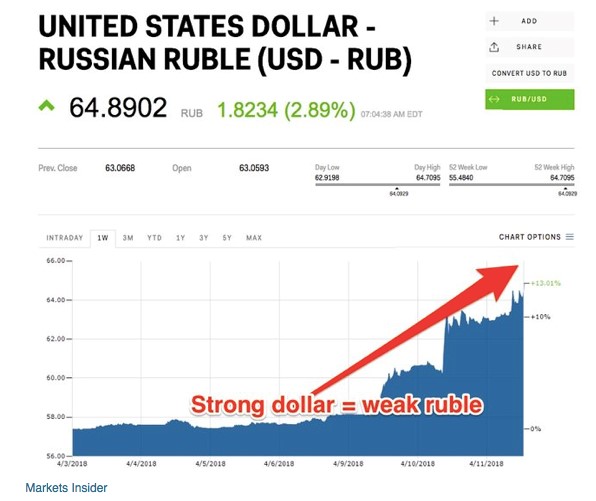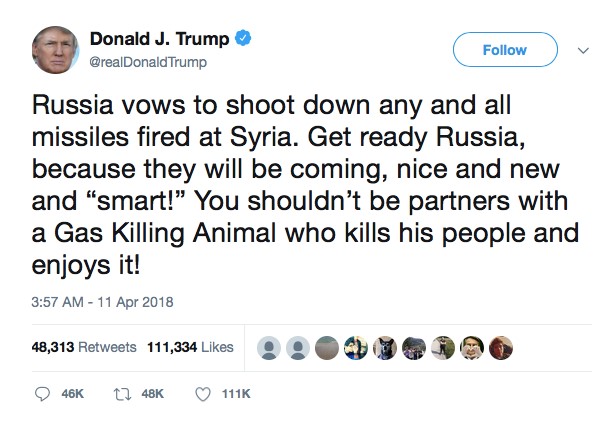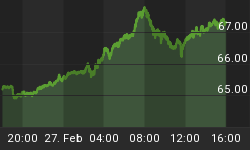A new round of U.S. sanctions has sent the Russian stock market crashing, along with the ruble, and caused business elite to lose tens of billions of dollars. Now, the downward spiral continues with Trump threatening retaliatory strikes in Syria as the Kremlin weighs economic revenge.
The ruble, already deflated 1.7 percent in early European trading Wednesday, faces a bigger spiral downward today as Trump’s Syria missile strike rhetoric hits fever pitch on Twitter.

(Click to enlarge)
As of mid-afternoon Wednesday, the ruble was down 2.8 percent against the dollar, helped along by a Trump tweet saying:

(Click to enlarge)
New punitive measures introduced by the United States on April 6 have already led to a massive crash in Russia's stock and currency markets.
Media report that new U.S. sanctions on seven oligarchs, 17 top officials and 12 companies led to tens of billions of dollars in losses on Russian markets within just a few hours on Monday.
In the meantime, the Kremlin is weighing potential economic retaliation designed to hit U.S. markets, but many feel such moves would harm Russia as much as the U.S. Related: Tesla Tops EV Charts Despite Production Delays
As Deutsche Welle (DW) points out, a common slogan for Russian T-shirts in 2014 was: “Sanctions? Our nuclear missiles are laughing themselves silly.” But this time around, the laughter is subdued. The sanctions’ bite is now breaking the skin and while Russia’s economy began to grow last year and adapted to the initial 2014 sanctions, the Trump sanctions won’t be as easy to overcome.
In the meantime, Russia is reportedly preparing a set of measures to fight back, but cautiously.
“The response has to be appropriate. Those who do bad things to us need to feel it on their own skin,” said Russian Prime Minister Dmitry Medvedev. “But the reaction shouldn’t be fatal for us.”
Igor Bunin, head of the Center for Political Technologies, a Moscow political consultant, told reporters that Russia “can’t do any harm to the U.S. without shooting ourselves in the arm, foot or some other part of the body.”
There are some mild expectations that Russia might hit out at U.S. companies operating in Russia as it did in 2014, when it had with McDonald's outlets closed down by health inspectors.
Other possible measures are restrictions on trade in products like titanium used in aerospace. As a major global supplier, Russia could restrict titanium sales but not without hurting export revenue.
Restrictions in cooperation in space launches or nuclear-fuel trade or even shift to a more confrontational stance on key foreign policy issues like Syria, North Korea or Ukraine are also possible responses.
“[The response] will probably come in terms of rhetoric and political symbolism,” Valery Solovei, a political scientist at the Moscow State Institute for International Relations, told Bloomberg, such as cutting off talks on nuclear weapons or increasing Russia’s military presence in Syria.
On Monday, the combined net worth of Russia’s 50 wealthiest people fell by $16 billion on Monday, erasing all of their year-to-year gains, just three days after the U.S. imposed sanctions.
Related: The Billionaires Racing To Conquer Space
One of the worst-hit stocks has been Sberbank—a key barometer of Russian economic health. Shares in Sberbank fell by more than 20 percent Monday. Shares hit a low of 200 RUB on Tuesday, then sanctions fears eased a bit, pushing it to 223 RUB and then down to 208 RUB after Trump’s Syria tweets.

(Click to enlarge)
This bank’s fate is of particular importance. In 2014, crippled by sanctions and falling oil prices that halved the ruble’s value, depositors panicked to the point that Sberbank almost witnessed a run on savings.
By Damir Kaletovic for Safehaven.com
More Top Reads From Safehaven.com:
















